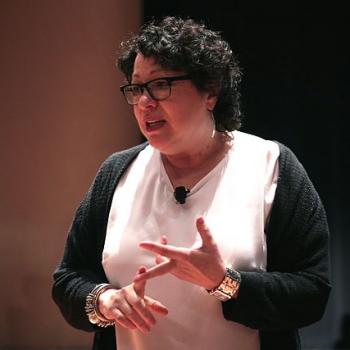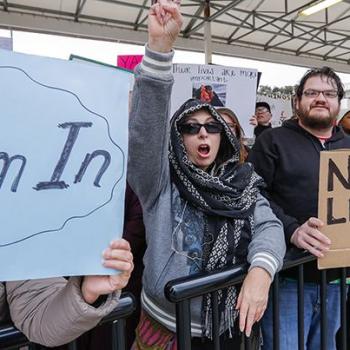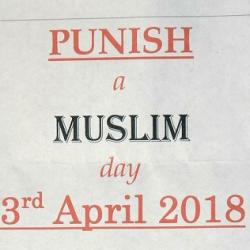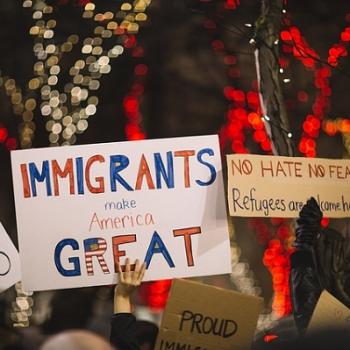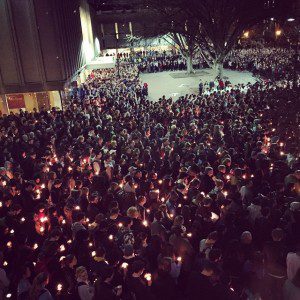
Inna lilahi wa inna ilayhi raji’oon. Surely we belong to God and to Him we return.
Sometimes you need time to process a tragedy. Sometimes no time is enough time to find the words to articulate all that is tumbling in your mind. Sometimes there is nothing left to do but grieve, be angry, let go of the anger, pray and continue to work for understanding and change. Even when the latter seems so hard to achieve.
Why? Why did Deah Barakat, Yusor Abu-Salha and Razan Abu-Salha have to lose their lives? What have we come to as an American, a human community, to see vicious crimes like these happen? Is this the product of the growing culture of Islamophobia — whipped up to a frenzy by politicians, movies and some media outlets? What does it say about our collective priorities and humanity when it took a furious outpouring of grief and outrage on Twitter to get the media to just report on this tragedy?
I’m struggling with what part of this story to address. Because as the days pass, there is so much that makes me, and thousands upon thousands of others, so heartsick. Do we talk about what so many have said before me – that if the tables were turned and the perpetrator was Muslim and the victims were not, how fast this story would’ve broke, how different the language would’ve been and how much more visceral would be the national outrage?
Do we talk about this ridiculous, ridiculous motive of being floated in many news articles that these execution-style deaths were the result of a parking dispute? Because if you believe that as the primary cause, then I have a bridge to sell you. Shall we get into the upcoming White House “Countering Violent Extremism” summit (slated to happen on February 18), where there are new programs being proposed in American Muslim communities in Los Angeles, Boston and other cities across the country? That in trying to route out potential extremism in American Muslim communities, our government is losing sight of how these communities are being targeted?
Shall we talk about the never-ending growth of Islamophobic hate speech and hate crimes in the United States, where according to the Washington Post’s Wonkblog, “Prior to the 9/11 attacks, the [FBI Crime Report] program typically recorded between 20 and 30 anti-Muslim hate crimes per year. But in 2001 that number rose more than tenfold to nearly 500. In the years since, annual hate crimes against Muslims have consistently hovered in the 100-150 range, roughly five times higher than the pre-9/11 rate.” Or how according to the FBI’s Uniform Crime Reports for 2013, Muslim Americans still face five times the number of hate crimes as they did before 9/11. Or even that presidential hopeful Gov. Bobby Jindal recently said Muslim Americans pose a threat to the United States.
Shall we turn on Atheists? Do to them what has been done to Muslims time and time and time again? Vilify an entire group due to the actions of one horrible person. Because that would not be hypocritical of Muslims, right? And if you don’t get that I’m being sarcastic here, let me be clear: I am. Working at Patheos affords me the wonderful privilege of learning about and working with numerous faith and non-faith groups. I could let myself be influenced by the likes of Sam Harris and Richard Dawkins in their comments about Muslims and Islam, or I can turn to Dale McGowan, the Atheist channel editor at Patheos, who has striven to foster respectful discourse within his channel and between his channel and mine.
(In fact, please see here for one of the wonderful things Dale is spearheading in wake of this tragedy. See what has been written by bloggers on his Atheist Channel here and here.)
Where do we begin? How do we grieve? How can we move on? What do we hold on to?
We hold on to Deah, Yusor and Razan. To who they were, how they lived their lives and all they did in the short span they had on this earth. We take inspiration in who they were, in how they walked through life as good humans dedicated to service, friendship, faith and family, among so many other admirable things. We take comfort in all the wonderful things being said about them. Said one friend who knew them in college: “These kids are the ones you pray your children will grow up to be.”
Said my cousin, who is an undergraduate student at the University of North Carolina at Chapel Hill:
I never got the chance to know Deah as well as I wish I had, but he’d always give me the warmest greetings with the biggest smiles.
One day I gave him a pretty flimsy handshake, and he took the time out to give me a step-by-step guide on how to give the greatest handshake in the world. A handshake people would remember you by. There was a sweet spot where the base of your thumb had to go.
No matter how short and simple our friendship was, hitting that sweet spot makes me appreciate him every single time.
Said Farris Barakat, brother of Deah, at a vigil held at UNC-Chapel Hill last night:
We’re taught that life is a bridge. You don’t want to build on the bridge. You want to build when you get there. So my brother, his wife and Razan lived a life where they were planning for the next life. They didn’t build for the bridge. They got to their destination. They are home. … I plead that you live in their legacy, that you share the good that you know of them, and take the message that my mom wanted to make public, and do not fight fire with fire…. We’ve lost three great citizens of this world, of this country. But, I think they’ve inspired thousands.
This is where we begin. This is what we grieve. This is what we take comfort in. This is what we hold on to. This is how we lift our heads up, vow to continuing living a good life and affect change.
Inna lilahi wa inna ilayhi raji’oon. Surely we belong to God and to Him we return.




